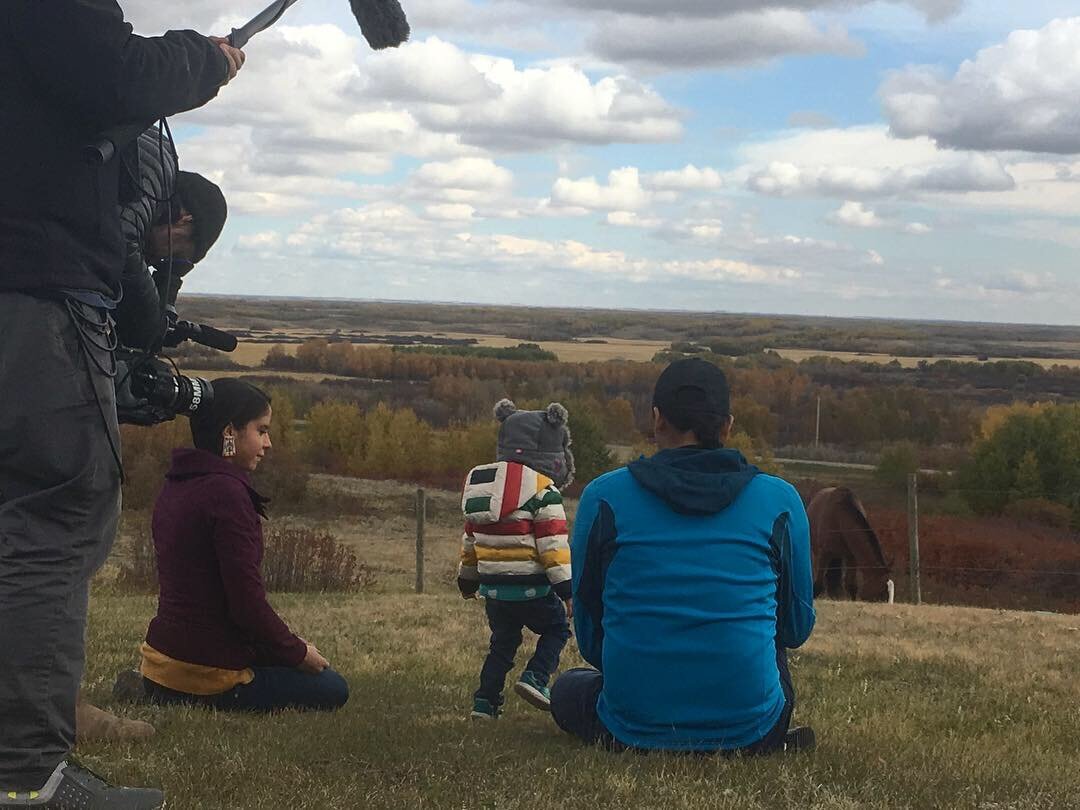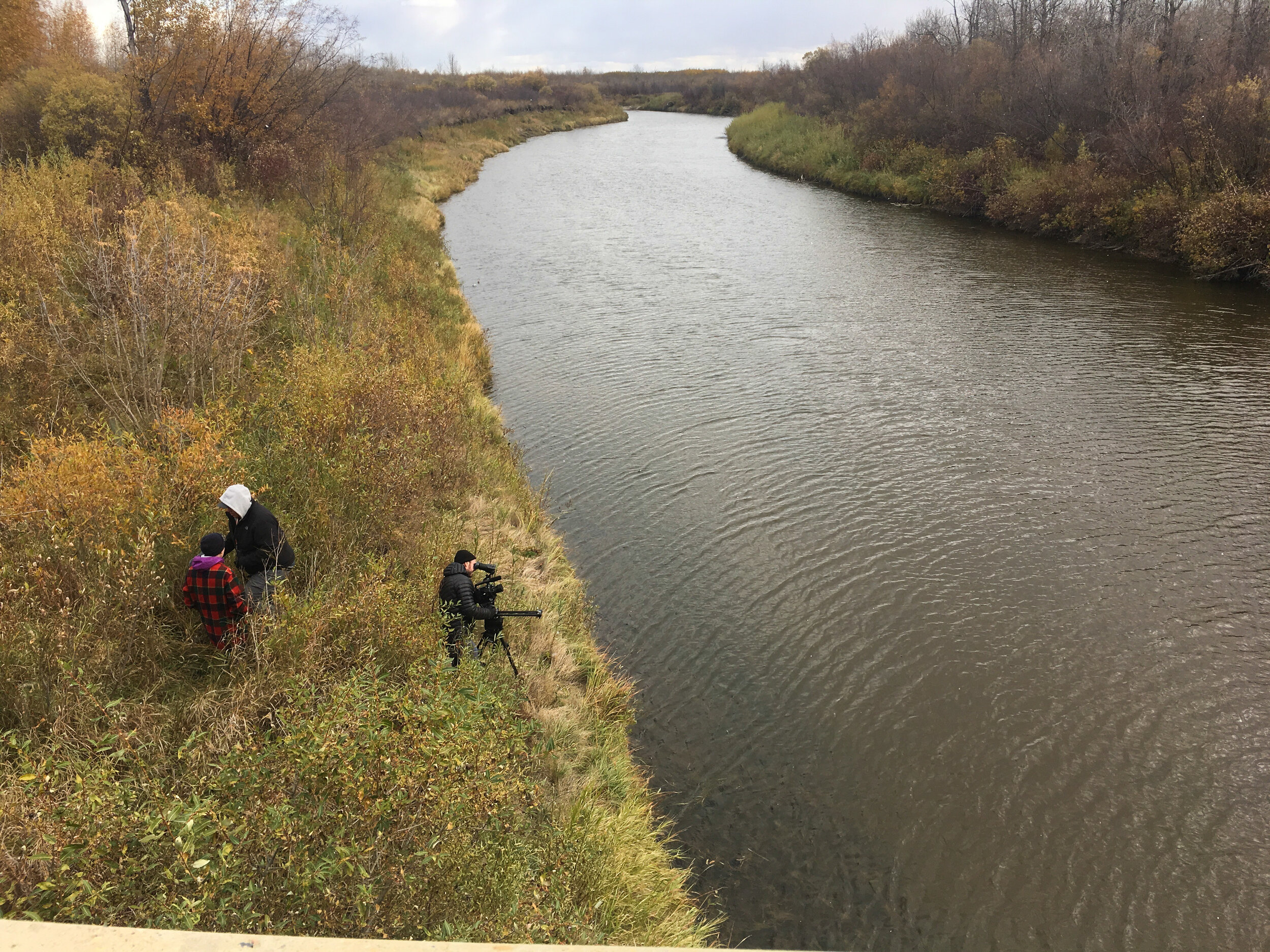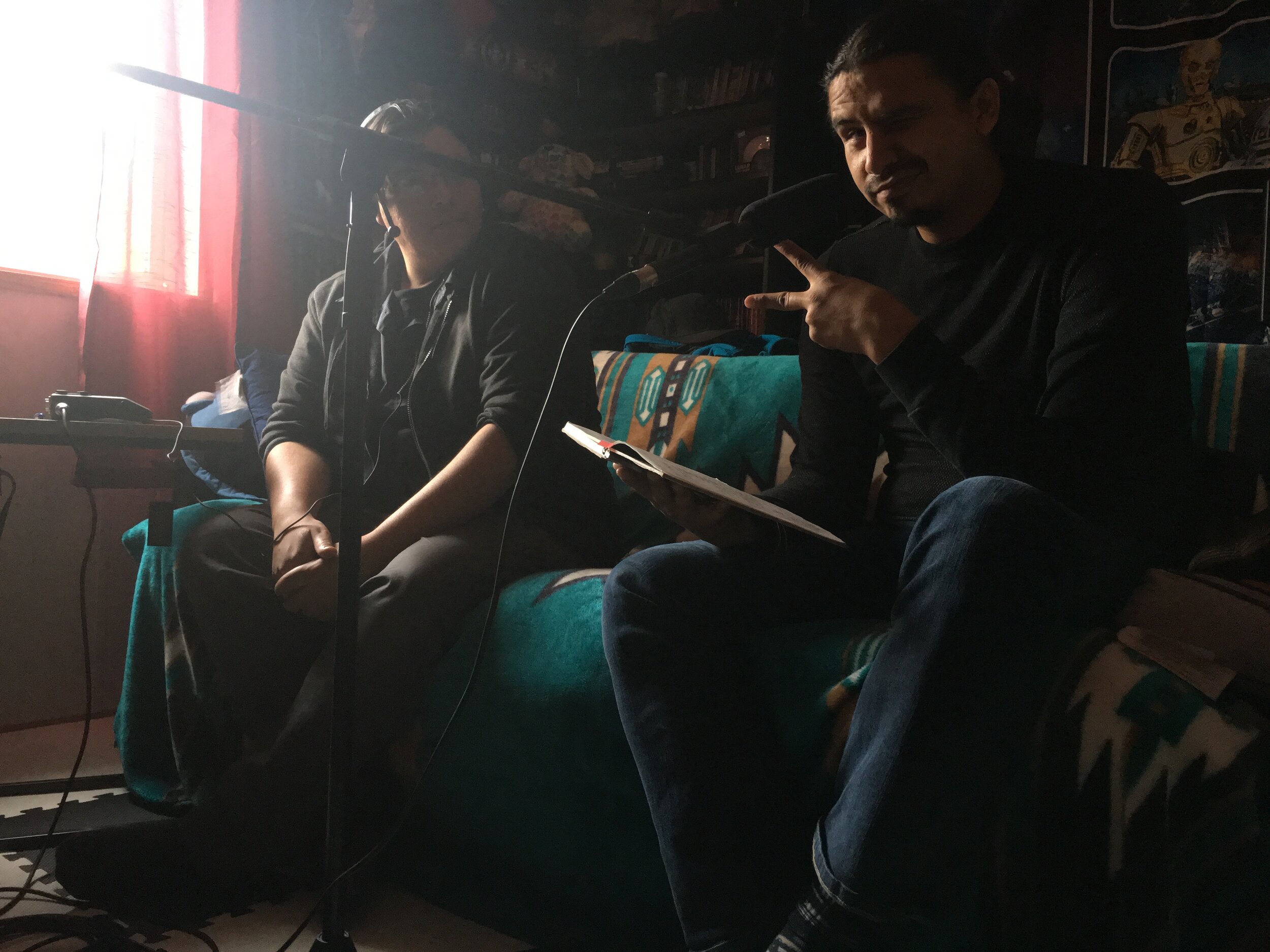Viewfinder: Candy Fox
Filmmaker Candy Fox and producing partner Chris Tyrone Ross on location
Envisioning a new path for Indigenous filmmakers
by Elian Mikkola
I first heard of Candy Fox five years ago, not long after moving to Saskatchewan. She was a soon-to-be-graduate from the film program at the University of Regina. I was taking my first film classes there, and her name was on everybody's lips — a new and promising voice among emerging Saskatchewan filmmakers.
A member of the Piapot First Nation in Treaty Four Territory, Fox describes how she always had an interest in storytelling, however she did not pick up on filmmaking as a passion until her teenage years when she became enthralled by cinema and acting.
Fox was cast in the television series, Moccasin Flats, a Canadian drama that ran on APTN and was later picked up by Showcase and SCN in the early 2000s. For Fox, acting was only the beginning. Through her experience portraying “Candy” on Moccasin Flats, she understood that she needed to get behind the camera.
At the time she decided to enrol in the film program at the University of Regina, the local film industry had just taken a severe hit.
“The film tax credit was just ending and so a lot of people felt sort of hopeless. Others questioned why I was going into a degree (program) where there was no guarantee for a financially lucrative career. I did it anyway because I didn't see any alternative. I knew that's where my heart was, and I honestly had already experienced being a ‘starving artist’, so I only had more experience to gain and nothing to lose.”
A few years later, her graduation film, Backroads (2015), was selected as one of the Toronto International Film Festival’s Top Ten of 2015, following multiple nominations, awards, and screenings nationwide.
“Backroads was about sexual violence within a family. It was dark in some aspects, but it was also very candid, because I knew the person who was at the centre of the documentary. In comparison to that, in my newest film the approach was quite different, since there was no event that was unfolding that I would follow or focus on. Instead of that, I had two people who allowed me to see a glimpse into their life through these diaries they write to their child. My goal was to create a poetic film looking into these two people’s way of parenting. I wanted to capture who they are, what they have to say about family and Indigenous kinship systems.”
Candy Fox’s film ahkâmêyimo nitânis / Keep Going, My Daughter continues on the path of strong storytelling, a recurring characteristic of Fox’s work. Filmed on Treaty 6 Territory, this 12-minute short is a poetic and hopeful film about two young parents, Colby Tootoosis and Andrea Landry, and their dreams for their daughter's future.
“I wanted to stay away from dark subject matters, because a lot of filmmakers had already captured some of the traumas within Indigenous storytelling or as it relates to colonial history here in Canada. I remember watching a film with my grandmother about residential schools, and we both held each other and cried. I have a lot of respect for films about these subject matters and I relate to them wholeheartedly, but as a filmmaker, I wanted to focus on something you don’t necessarily hear about, and one of those things is healthy Indigenous families and kinships. I think it is also important to show how people my age or younger are choosing to explore the traditional ideas, and shedding those old systems that were learned through colonization. I guess this film was my way of doing that, and putting different kinds of stories out there”.
ahkâmêyimo nitânis was produced through the National Screen Institute’s IndigiDocs program, which Fox was already familiar with through her work on Trudy Stewart’s film, From Up North (2016).
“Trudy and Janine Windolph were making that film as a part of the program, and Trudy hired me as the camera assistant to work on the production, and it was a very positive experience for me.”
She describes the process of making ahkâmêyimo nitânis as very intuitive from the beginning.
“Trudy messaged me a couple days before the deadline and encouraged me to apply. I had a broad idea about Colby and Andrea’s relationship in mind at the time, and I ran it through my collaborator, (producer) Chris Tyrone Ross. He liked it, and we quickly decided to put an application together”
Fox and Ross, whom she had gotten to know through several collaborative projects in the past, were selected for the program in 2017. They attended the NSI’s boot camp for documentary filmmaking that took place in Winnipeg in early 2018 with other program participants from across Canada. Fox describes how the experience made her realize the opportunities and infrastructure for documentary filmmaking that exist outside the province.
“It was almost like a crash course for documentary filmmaking, told from a perspective of different Indigenous filmmakers. (Our) two main mentors were Lisa Jackson and Shane Belcourt who both have their own individual styles. They would give us information about their form, methods, technique and experiences all the way from pre-production to post-production. We learned a lot about how to pitch your film and got to practice that in person at Hot Docs as part of the IndigiDocs program”
As Fox and her producer moved forward with the program, their film started to take a new form organically.
“One thing I really learned from IndigiDocs came from one of the mentors, Shane, who would continuously ask me what my film was about. As a filmmaker, he was all about structure, before filming anything, whereas I planned to go in with my own form of filmmaking where the structure of the film comes after the subject shares their story. Every time we would talk about my film, he would remind me that he still didn’t know what my film was about, and that really pushed me to expand on my own comfort zones and push for a solid structure before shooting. I knew that I needed to find a way to express the story in a poetic way, so when I found out about the journals that Colby and Andrea write to their daughter, it all fell into place.”
Fox’s vision from the beginning was to create a documentary film that presents itself in a poetic form. ahkâmêyimo nitânis demonstrates a strong connection between the storytelling and its visuals. The bond between sound and image, creative yet subtle editing, and beautiful minimal cinematography together make this film such a resonant viewing experience. Fox co-edited the beginning sequence for the film, but also worked with a professional editor for the first time in her career.
“A filmmaker that I have a lot of respect for had given me advice about how having a good editor can bring your film to another level, so I followed that advice and it was the best decision I could make, because that is exactly what happened with my editor, Jackie Dzuba”
ahkâmêyimo nitânis was completed in early 2019, and premiered that year at Hot Docs alongside Tasha Hubbard’s nîpawistamâsowin: We Will Stand Up (2019). When asked about the current representation of Indigenous filmmaking in Canada, Fox, who herself is Plains Cree with Vietnamese and Métis blood lineage, describes it as a renaissance. “There are great strides that are happening within the film industry for Indigenous filmmaking. Especially before the pandemic, you could see how it was really booming, with the opening of the Indigenous Screen Office, and all the amazing work coming from Indigenous filmmakers within Canada. Just attending the imagineNATIVE Film Festival last year, we saw so many incredible films from makers like Elle-Máijá Tailfeathers and Jeff Barnaby who are creating really solid films that are dominating mainstream venues like Netflix and being screened in sold out venues. It is filmmaking at its best.”
ahkâmêyimo nitânishas already screened in several film festivals around the world and has received a lot of praise; it won the Best Short film award at the Saskatchewan Independent Film Awards in 2019. “People really seem to like it, and I’ve had many people, Indigenous and non-Indigenous, approaching me and saying how they feel that everyone should live that way, and parent in the same way as Colby and Andrea are parenting their child. At imagineNATIVE we also received a big cheer from the audience after screening the film.”
When asked about the future, Candy takes a long breath. The current situation with COVID-19, has put some of her own projects on hold, although she continues working in the field in other ways. She is currently involved with the production of reality TV series, The Other Side, on APTN. Now in its seventh season, the series looks at the spirit world through paranormal investigation. Fox began work as an assistant director for season six, during which time she directed one episode. She is now directing six of the thirteen episodes for season seven. In the meantime, she has received a research grant from the Saskatchewan Arts Board (now SK Arts) that she is using to develop her next film, and is anxiously waiting for the time after the pandemic in order to get things moving again.
“I feel that the past few months have been a time for reflection. After this crisis is over, hopefully a lot of amazing art will come from the self-reflection that happened while in isolation. I know that my next project will be a film I am planning to make about my Vietnamese lineage on my dad’s side. So, whenever it is safe to travel again, I will move forward with it”.
When looking back on her decision to enroll in the film program and try to make a career in filmmaking, Fox reflects on the journey with a new understanding.
“I didn't realize that it would be so fulfilling for me. It has really defined me as a person, to share and create stories about the world and other human beings. I could not see myself doing anything else.”
Elian Mikkola is a moving image artist based between Montréal and Regina. Their work has been showcased in several film festivals in Canada and internationally. Mikkola completed their MFA in 2019 at the University of Regina. They are a part of La Lumière Collective and an active board member of Queer City Cinema.




